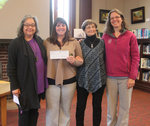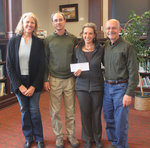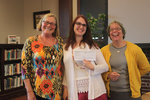Working with kids was the common theme at the May 18 Jefferson County Community Foundation (JCCF) Giving Circle grant award event. The Port Townsend Public Library, the Northwest Watershed Institute …
This item is available in full to subscribers.
We have recently launched a new and improved website. To continue reading, you will need to either log into your subscriber account, or purchase a new subscription.
If you had an active account on our previous website, then you have an account here. Simply reset your password to regain access to your account.
If you did not have an account on our previous website, but are a current print subscriber, click here to set up your website account.
Otherwise, click here to view your options for subscribing.
* Having trouble? Call our circulation department at 360-385-2900, or email our support.
Please log in to continue |
|



Working with kids was the common theme at the May 18 Jefferson County Community Foundation (JCCF) Giving Circle grant award event. The Port Townsend Public Library, the Northwest Watershed Institute and the North Olympic Salmon Coalition received a combined $40,000 from two of the philanthropic organization's Giving Circles, groups of like-minded people who want to pool their charitable resources.
Ken Grafham, JCCF executive director, welcomed the crowd of about 30 people gathered May 18 in the Port Townsend Public Library's Carnegie Reading Room.
On behalf of the Better Living Through Giving Circle, Janie Kimball presented a check for $10,000 to Melody Sky Eisler, director of the Port Townsend Public Library, and Kit Ward-Crixell, its youth services librarian. Ward-Crixell is to manage the grant, offering one- to three-day "Girls Create!" camps in Port Townsend and Jefferson County. The girls-only camps are designed to encourage girls' interest in science, technology, engineering, art and math, known by the acronym STEAM. Among the hands-on projects are making wearable electronics, cardboard furniture, iPhone speakers and other items, and include support materials the girls can take home with them.
The Better Living Through Giving Circle granted $10,000 to the Northwest Watershed Institute (NWI). Jude Rubin, director of stewardship for NWI, accepted the award from Francesco Tortorici. Invoking Edward O. Wilson, Rubin spoke of the need for conservation before describing the launch of the new Youth Environmental Stewards (YES) program through an accredited high school class called "Watershed Science and Stewardship."
"High school curriculum needs to be changed," Rubin said. The new program's environmental education is based on service learning. "We bring people out, and they learn by doing," she said. "It's a pre-career pathway for environmental science and advocacy."
Caleb Lumbar, a junior who plans to take the class next year, said he's glad to take a class that allows him to be outside. The class starts out with five day-and-night field intensives, before students spend 30 hours on five community projects.
Science education for Jefferson County youths also received a boost with a $20,000 grant from Giving Circle 3, awarded to the North Olympic Salmon Coalition (NOSC). Stewardship coordinator Sarah Doyle described NOSC's plans to incorporate climate-change curriculum into the "real learning, real work" middle school science curriculum, through which students provide community education, pot 1,000 native trees at a native plant nursery, and erect an interpretive sign about native plants at Finnriver Farm & Cidery, located on Chimacum Creek.
Sixth-graders learn about propagating plants and why it matters while potting trees; and in seventh grade, they go to stream restoration sites, plot them and figure out how and where to plant the trees, Doyle said. "They're really learning how in the real world we're managing these restoration projects," she said. "We're creating the next generation of stewards."